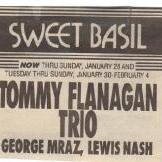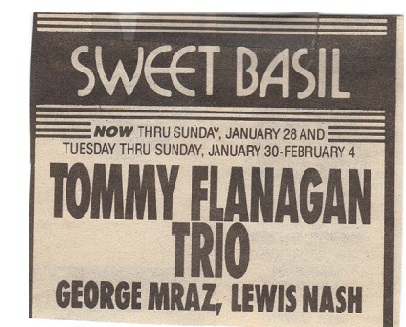-
Posts
14,849 -
Joined
-
Last visited
-
Donations
0.00 USD
Content Type
Profiles
Forums
Events
Blogs
Everything posted by Hardbopjazz
-
Old news to me. Has jazz become America’s least-popular genre? According to Nielsen‘s 2014 Year-End Report, jazz is continuing to fall out of favor with American listeners and has tied with classical music as the least-consumed music in the U.S., after children’s music.* Both jazz and classical represent just 1.4% of total U.S. music consumption a piece. However, Classical album sales were higher for 2014, which puts Jazz at the bottom of the barrel. This continues an alarming trend that has seen more and more listeners move away from jazz every year. Album sales have long been a key measure of the popularity of individual genres, and year after year jazz album sales continue to fall. In 2011, a total of 11 million jazz albums (CD, cassette, vinyl, & digital) were sold, according to BusinessWeek. This represents 2.8% of all music sold in that year. However, just a year later, in 2012, that percentage fell to 2.2%. It rose slightly to 2.3% in 2013 before falling once again to just 2% in 2014. Full article http://thejazzline.com/news/2015/03/jazz-least-popular-music-genre/?utm_content=bufferedf1e&utm_medium=social&utm_source=facebook.com&utm_campaign=buffer
-
Yes, that's where I found this. I've sent an email to someone that I am sure would know. Thanks.
-
-

Album covers showing the Eiffel Tower
Hardbopjazz replied to Hardbopjazz's topic in Miscellaneous Music
-
-

Album Covers with Surrealist Art
Hardbopjazz replied to Teasing the Korean's topic in Miscellaneous Music
-
Anyone familiar with this? It is new to me and I really enjoy Don Pullen. I don't recall ever seeing this before.
-
yes. It is from a Japanese album site. Wow. From another site I just realized this one is different than the one you can't see.
-

Album covers showing the Eiffel Tower
Hardbopjazz replied to Hardbopjazz's topic in Miscellaneous Music
-

Album Covers with Surrealist Art
Hardbopjazz replied to Teasing the Korean's topic in Miscellaneous Music
-

Happy Birthday B. Clugston!
Hardbopjazz replied to GA Russell's topic in Miscellaneous - Non-Political
Happy Birthday. -

Album covers showing the Eiffel Tower
Hardbopjazz replied to Hardbopjazz's topic in Miscellaneous Music
-
-

Album covers showing the Eiffel Tower
Hardbopjazz replied to Hardbopjazz's topic in Miscellaneous Music
Yes. You seem to have issues with Japanese sites. -

Album covers showing the Eiffel Tower
Hardbopjazz replied to Hardbopjazz's topic in Miscellaneous Music
Try this one. http://www.hirescovers.net/gallery/albums/userpics/10117ov2/normal_Passport_To_Paris_DVD.jpg It is the DVD not the CD. -
With WSQ playing in NYC this May, I've been playing Wayne Shorter all day in anticipation of the concert. I found this article online. Pianist Renee Rosnes interviewed the band. 04/10/13 Renee Rosnes Over the past dozen years, saxophonist and composer Wayne Shorter’s quartet featuring pianist Danilo Pérez, bassist John Patitucci and drummer Brian Blade has become a paragon of jazz’s exploratory spirit. The band’s must-experience concerts, with their seamless programs and apparent sense of collective intuition, boast the sort of peaks and valleys that only genuine creative risk taking can generate. Without a Net, Shorter’s first effort for the Blue Note label in over four decades, gathers inspired moments from the group’s 2011 European tour and contains six previously unrecorded Shorter originals. This conversation was recorded in front of a live audience last September, during a JazzTimes-sponsored panel session at the 2012 Detroit Jazz Festival. It brings together all four quartet members and the acclaimed pianist Renee Rosnes, who played in Shorter’s band in 1988. RENEE ROSNES: The quartet has been together for 11 years, which is quite an accomplishment. How did the band come together? WAYNE SHORTER: Basically in telephone conversations and just observation. I met Danilo in Washington, D.C. I knew John for quite a time. He was playing with other groups. And I heard about Brian Blade. Someone said, “Watch out for that guy named Blade, man.” The magic came after the meeting. RR: I hear freedom in what this group does, a willingness to go in any direction and explore. Do you think that mindset was there the first time you played together? JOHN PATITUCCI: I think the influence that Wayne had on all of us, way before we ever met, was strong. The seeds of it were certainly there, but I think, just like anything else, individuals are not as important as their community. DANILO PÉREZ: [it was like I] got enrolled in this galactic master’s program. I see now, when I look back in my life, that it didn’t only help me with music but actually made a huge change in my life as a human being. WS:[Charlie Parker was asked,] “Why did you guys play bebop? What are you trying to do with that? Modern jazz, progressive music and all that.” His answer was he didn’t play this music to show off his virtuosity. He’s playing this new music, bebop—which is going to be something else later on—to be human. To be human, coupled with kind of a social movement without protesting in the streets. I just heard somebody today, an entrepreneurial businessman, saying, “Small businesses”—and he’s speaking for a lot of people—“do business not for business, but because we want to change the world.” That’s the first time I ever heard that from a businessman. So that [term] “creative business” must be in there. To think creatively means that you’re thinking about not just the money but about the human factor. Human beings have to evolve just as fast as technology. The incentive to do things seems to be money, power and fame and all that stuff. I think there’s an untapped incentive that now we’re embarking on: We’re gonna step on this galactic spaceship, which is going to take us places and teach us new incentives. It’s called the incentive of the heart. RR: I heard once that Louis Armstrong said, “What we play is life.” I hear a range of emotions in your music; I hear a lot of humanity in the music that you make together. I don’t hear a lot of ego. But the question is, would you agree with what Louis said? BRIAN BLADE: I would totally agree with that. [With Wayne,] we submit to each other in this way that can build a community. You have to look to your neighbor; you have to look around you. These men are all about that. When I look across the stage, there’s a heightened sense of submission to that moment and to the potential to see that collective effort rise above your imagination. So I think that hopefully we all want that from life. We have such love and reverence for Wayne, just for who he is. You look at the writing, his creative gift. For me it’s just perfect. We can just play [the written music] from measure zero to one hundred, but he doesn’t want that! He’s like, “Let’s just get away.” It’s interesting that he trusts us that much to say, “Let’s create something together, right now, with no script. Take a chance.” JP: Also, the beauty of not being afraid to be childlike and be totally vulnerable, to take all kinds of chances. I think for me, and for all of us, that was so freeing—to be working with somebody who wrote such genius music who wasn’t captive to what he wrote. He had a light touch on it; it didn’t hold him hostage. So when we played, he was talking about “Let’s get back to the place, but let’s play like we don’t even know how to. Let’s be that bold.”.... Full article http://jazztimes.com/articles/76472-a-conversation-with-the-wayne-shorter-quartet
-
I don't even want to think of a world without Roy.
-

Album covers showing the Eiffel Tower
Hardbopjazz replied to Hardbopjazz's topic in Miscellaneous Music
-

Album covers showing the Eiffel Tower
Hardbopjazz replied to Hardbopjazz's topic in Miscellaneous Music
Like I said before (#2031)," I can see only that black cross again...." Here's another image -
-

Album Covers with Surrealist Art
Hardbopjazz replied to Teasing the Korean's topic in Miscellaneous Music
-

Album covers showing the Eiffel Tower
Hardbopjazz replied to Hardbopjazz's topic in Miscellaneous Music
Here is the link http://c3.cduniverse.ws/resized/250x500/music/943/1092943.jpg -

Album covers showing the Eiffel Tower
Hardbopjazz replied to Hardbopjazz's topic in Miscellaneous Music
Could it be your internet provider that is blocking the image? -

Album Covers Featuring Moderne Furniture
Hardbopjazz replied to Teasing the Korean's topic in Miscellaneous Music
-
Happy Birthday, where ever you are.
_forumlogo.png.a607ef20a6e0c299ab2aa6443aa1f32e.png)
